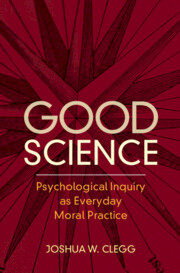Part I - Clearing the Ground
Published online by Cambridge University Press: 06 January 2022
Summary
I don’t necessarily want to begin this book with an involved critique of scientism or objectivism. The job has been done and more than once.1 Yet here I am, marshalling my wits and courage. I feel the need to pick the same old fights mostly because psychologists (and other scientists) are, from our earliest education, inoculated with a set of immunities against a moral understanding of our work. That moral understanding is, I think, quite straightforward; it is easy to see how and why we have particular responsibilities to particular persons and communities at particular moments in scientific practice. But these particularities of moral responsibility are dismantled and obscured by a scientistic education. So much so that what should be obvious and second nature – namely, that science is a community, and that good science means personal integrity and principled commitment, moral responsibility to, and care for, particular persons, and good citizenship – is, at best, an invisible background assumption and, at worst, a simply alien way of thinking about science.
- Type
- Chapter
- Information
- Good SciencePsychological Inquiry as Everyday Moral Practice, pp. 11 - 38Publisher: Cambridge University PressPrint publication year: 2022

